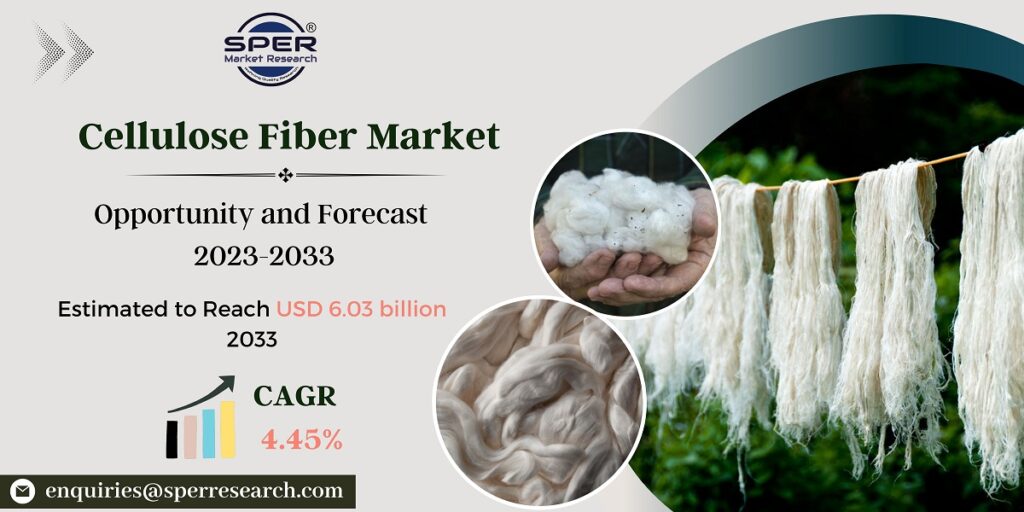Cellulose Fiber Market Growth, Emerging Trends, Scope, Business Challenges, Key Players, Opportunities and Future Outlook 2023-2033: SPER Market Research

Cellulose fibers, known as manufactured fibers, are derived from either wood pulp cellulose or plant stalks. These fibers are renowned for their versatility and possess unique characteristics like moisture absorbency and hydrophobicity. They can be broadly classified into two categories: natural cellulose fibers (such as cotton and jute) and man-made cellulose fibers (including viscose, lyocell, and modal).
According to SPER market research, ‘Cellulose Fiber Market Size- By Fiber Type, By Application- Regional Outlook, Competitive Strategies and Segment Forecast to 2033’ state that the Global Cellulose Fiber Market is predicted to reach USD 6.03 billion by 2033 with a CAGR of 4.45%.
The expanding demand for environmentally friendly and biodegradable fibres is a major factor in the market growth for cellulose fibre. Businesses are looking for alternatives to petrochemical-based fibres that release large quantities of carbon as worries about climate change, environmental pollution, and sustainability gain popularity. It is anticipated that this rising demand for cellulose fibres will continue to fuel market expansion. For instance, PURCELL, a recyclable substitute for glass-fiber-reinforced polymers, was developed by the German Institutes for Textile and Fibre Research Denkendorf (DITF) utilising cellulose as the main component. In addition, urbanisation and rising consumer spending power are driving a shift in consumer behaviour from need-based to aspiration-based purchasing, which is boosting demand for textiles and apparel. Given the widespread use of cellulose fibers in the textile industry, the growth of the cellulose fiber market is anticipated to align with the expansion of the textile and clothing sector during the forecast period.
However, challenges such as high capital intensity, fluctuating raw material prices, declining cotton production, and stringent environmental regulations need to be addressed. By overcoming these challenges and capitalizing on the growing demand, the cellulose fiber market can unlock its full potential and cater to the increasing need for environmentally conscious and versatile fiber solutions.
Request For Free Sample Report @ https://www.sperresearch.com/report-store/Global-Cellulose-Fiber-Market.aspx?sample=1
The COVID-19 epidemic had a conflicting effect on the world market for cellulose fibre. The market first experienced supply chain disruptions, decreased demand, and temporary shutdown of production facilities. The decline in the textile, garment, and automobile industries had an impact on the demand for cellulose fibres. But as the epidemic spread, there was a stronger emphasis on sustainability and environmentally friendly products, which opened up chances for cellulose fibres. The industry was also aided by the increased demand for hygiene supplies and medical fabrics. Despite the difficulties caused by the pandemic, the market for cellulose fibres has bright long-term prospects because of rising environmental concerns and shifting customer tastes.
Geographically, Asia Pacific, led the cellulose fiber market due to high demand in the textile and industrial sectors. The region is expected to maintain its growth trend, driven by increasing demand from industrial, textile, and other applications. Major markets in the region include China, India, Japan, South Korea, Pakistan, Taiwan, and Indonesia. Vietnam and Bangladesh offer potential future growth. However, strict forestry regulations may hinder market growth. Europe and North America are mature markets expected to show relatively stagnant growth. Additionally, some of the market key players are Daicel Corporation, Eastman Chemical Company, Sappi Limited, Sateri, Others.
For More Information, refer to below link: –
Cellulose Fiber Market Future Demand
Related Reports:
Follow Us –
LinkedIn | Instagram | Facebook | Twitter
Contact Us:
Sara Lopes, Business Consultant – USA
SPER Market Research
+1-347-460-2899





